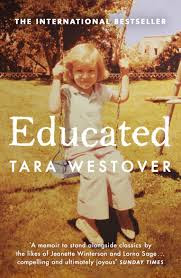Tara's birth was not registered and she essentially did not exist in the legal sense of paperwork, until her mother applied for a birth certificate for her when she was 9. She was taught at home to read and use basic number skills, but after that was put to work in her father's junkyard and assisting her mother, who was a herbalist and midwife.
At the age of 16, Tara decided she wanted an education. She bought an algebra textbook and began teaching herself the maths she needed to pass a college entry certificate. At 17, she left her family against her father's wishes to attend the Mormon college, Brigham Young University. She ultimately ended up studying at Harvard and at Cambridge University in the UK, graduating with a doctorate in History. In the process of gaining her education, the beliefs she had been taught by her family were challenged and eventually she ended up estranged from her parents and some other family members.
Her family was... dysfunctional, I think would be the best descriptor. Her father's belief that everything was God's will meant that he was negligent to the point of causing accidents to happen to the children. Later, one of her brothers subjected her to emotional abuse and physical violence. I found the story of Tara's quest to be educated a painful but inspiring one. I finished it some days ago now, but it has stayed in my mind and I keep thinking about it and about her experiences.
One of the messages that I have taken from the book is the benefit of self-education and of motivation to learn:
"My parents would say to me all the time: you can teach yourself anything better than someone else can teach it to you. Which I really think is true. I hate the word “disempower,” because it seems kind of cliché, but I do think that we take people’s ability to self-teach away by creating this idea that that someone else has to do this for you, that you have to take a course, you have to do it in some formal way. Any curriculum that you design for yourself is going to be better, even if it’s not the absolute perfect one. You will follow what you care about." (Tara Westover in an interview with Vanity Fair)
If you are trying to decide whether or not you want to read 'Educated', I suggest watching this video of an interview with Tara Westover:










